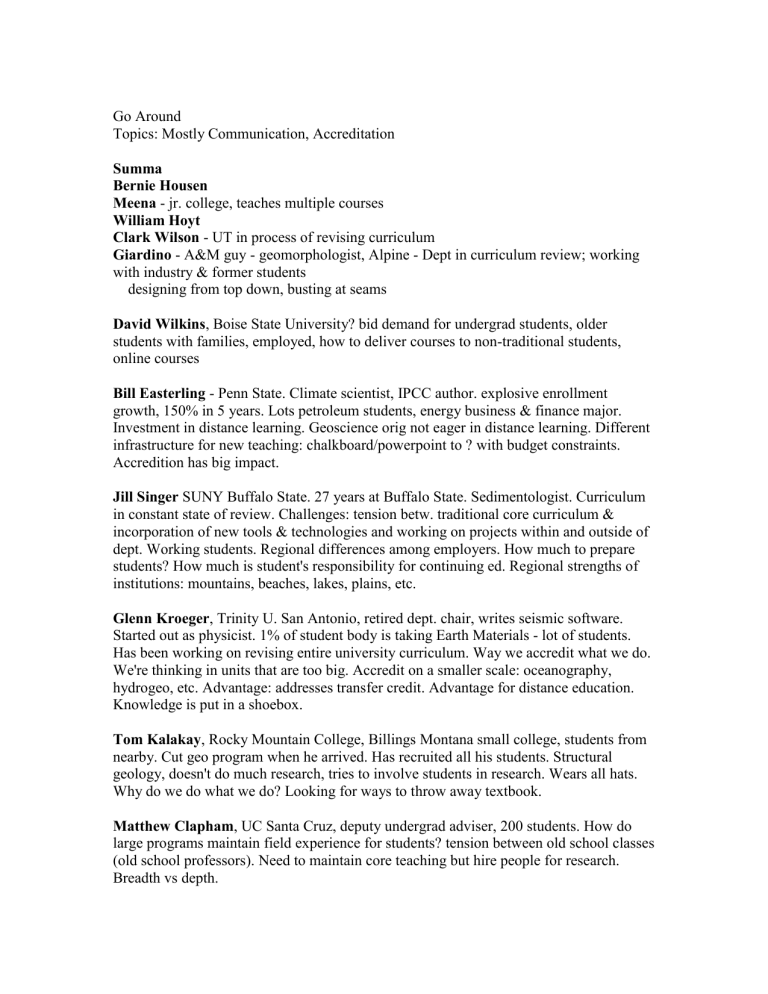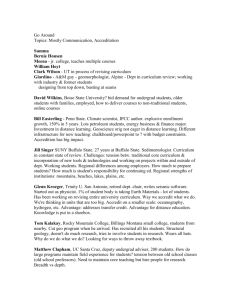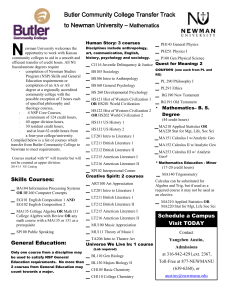Notes 3

Go Around
Topics: Mostly Communication, Accreditation
Summa
Bernie Housen
Meena - jr. college, teaches multiple courses
William Hoyt
Clark Wilson - UT in process of revising curriculum
Giardino - A&M guy - geomorphologist, Alpine - Dept in curriculum review; working with industry & former students
designing from top down, busting at seams
David Wilkins , Boise State University? bid demand for undergrad students, older students with families, employed, how to deliver courses to non-traditional students, online courses
Bill Easterling - Penn State. Climate scientist, IPCC author. explosive enrollment growth, 150% in 5 years. Lots petroleum students, energy business & finance major.
Investment in distance learning. Geoscience orig not eager in distance learning. Different infrastructure for new teaching: chalkboard/powerpoint to ? with budget constraints.
Accredition has big impact.
Jill Singer SUNY Buffalo State. 27 years at Buffalo State. Sedimentologist. Curriculum in constant state of review. Challenges: tension betw. traditional core curriculum & incorporation of new tools & technologies and working on projects within and outside of dept. Working students. Regional differences among employers. How much to prepare students? How much is student's responsibility for continuing ed. Regional strengths of institutions: mountains, beaches, lakes, plains, etc.
Glenn Kroeger , Trinity U. San Antonio, retired dept. chair, writes seismic software.
Started out as physicist. 1% of student body is taking Earth Materials - lot of students.
Has been working on revising entire university curriculum. Way we accredit what we do.
We're thinking in units that are too big. Accredit on a smaller scale: oceanography, hydrogeo, etc. Advantage: addresses transfer credit. Advantage for distance education.
Knowledge is put in a shoebox.
Tom Kalakay , Rocky Mountain College, Billings Montana small college, students from nearby. Cut geo program when he arrived. Has recruited all his students. Structural geology, doesn't do much research, tries to involve students in research. Wears all hats.
Why do we do what we do? Looking for ways to throw away textbook.
Matthew Clapham , UC Santa Cruz, deputy undergrad adviser, 200 students. How do large programs maintain field experience for students? tension between old school classes
(old school professors). Need to maintain core teaching but hire people for research.
Breadth vs depth.
Summa summarizes our task:
Curriculum today; Technology tomorrow;
JS: Accreditation
BE: interested in improving outcomes - alternative to accreditation. Disadvantage of accred: diverts from goals.
Advantage: shield
ABET: American Board Engineering ?
ACS?
Accred barriers to interdisciplinarity.
DW:
ASBOG: American
JS: some enrollments growing, some parts facing extinction. How to answer: what does a geoscientist do? We are outnumbered by engineers. Who are we? What can we contribute? Why not just have engineers do the work?
MC: Geo is still small dept compared to biology.
Engineers want to outsmart Mother Nature; Geos know that Mother Nature always wins.
Geos don't get the word out about what we do.
Geo is truly an interdisciplinary science
We don't emphasize public outreach - but that is changing. Not changing rapidly, but changing.
Faculty now encouraged to contribute more to outreach. [Read paper]
New generation is taking on outreach.
Universities allow reallocation of priorities, less pressure on publication/research. Still publish or perish for tenure & promotion.
Need outreach to tell public what scientists do.
What needs to change in university?
Who's bringing money into university? that controls what university does.
Difficult to take courses in other departments: policy (requires pre-reqs), GIS
Risk of being too broad. How to prepare a student adequately in 4 years?
Institutional barriers to being able to take classes in other departments.
Constraints of budget - $ coming from retirements. Need to do strategic re-investment.
Hire people who are comfortable working with people in other disciplines.
Previous view: Indisciplinary research is NOT real science.
Now trying to change point of view, but people around are the same people who fought this view.
JS: Return to student as learner. Base teaching on when student is ready to learn. Older geos had traditional backgrounds, and added other skills later. How: one person has skills in basket that he/she brings to a collaboration. Students can manipulate data but not evaluate it - prevents the ability to use this data effectively.
GK: Curriculum studies: curriculum does not matter. Student success is based on contact with good faculty.
Lists of what to cover in courses. Value of learning how to learn.
BH?: small-focus problem, learned how to find info, incorporated wide learning, but from this small focus.
JS: contact with engineers, geoscientist perspective. teach content, teach skills, help students appreciate how we as a discipline think about things.
BE: importance of discipline, "there's our engineer"
LS: We had courses with labels, later got rid of them. Lost core competencies because of it. Need to go back to core competencies. But the younger generations are working well with other disciplines, cooperating on projects, different from older generation. Learned from the "lost cores"
BE: No escaping core competencies.
JS: Boom & bust cycle of geo.
?: Brought us back to needs of students. Students fighting for jobs to feed families.
Accreditation hinders attempts to serve students.
JS: Important to assign societal relevance to curriculum. ES is relevant, so why is enrollment so low? Required Earth Science curriculum in high school in NY State has ruined the field for many young people.
GK: Don't have earth science in high school in TX.
BE: How to grow earth science enrollment in universities? Other sciences are doing it.
BH: Students are interested in environmental topics, should be easy to interest these students.
DW: Camping for credit.What is the demand for earth science teachers? Depends on state. States don't have much earth science education, so low demand for students.
MC: Educate advisers to funnel students interested in science into geology rather than environmental science (not science).
Team up with advisers, take them out to lunch.
High school classes depend on what U of California requires, gives credit for.
What’s worked?
Mix of university core values against dept offerings interdisciplinary databases overlaps avoided gaps identified
Opportunities for research as freshmen/hs students leverage local firms, governments leverage other departments (e.g. physics) virtual inter coordinators through alumni leverage university state of art tools track alums & collect data from them. Ask what was helpful. undergraduate research projects has led many to continue in grad school ug research is more valuable for students not going to grad school ug research can start in freshman year (course embedded). At 2yr colleges, faculty/student ratio doesn’t promote it.
Research and research-like experience can be embedded in class
Community college experience, students limited in courses they can take
Industry supported program for hs students to do research with ug or grad students on local issues “Caring for our watersheds” $ for student, $ for school.
Geoscience promotion, career choice starts in high school.
Research on any topic develops skills
Successful approaches to skill based vs. broad based.
President’s directive “liberal arts” is important
State legislature etc. insists on “skills”
Industry wants problem solvers, listeners, communicators.
Geo depts. have to promote that they are providing problem solvers, listeners, communicators.
Difficulty of recruiting minority students: doctors & lawyers dress better
Students don’t always recognize the value of a research project until much later.
Good to list high level skills rather than list of topics covered. “embed skills into the content of our discipline”
Embrace a list of practices we can use
Value of research project, field project into coursework. (College of Wooster does this)
Student recommendation letter: line of sight
Interpersonal relationship between faculty member & student is the most valuable component to the student, not matter if the science is successful.
The value of failure in the educational experience
Summit Saturday pm
2:15 pm
Intermediate working group #2
JGB 2.310
Lori Summa presented the Working Group 3 powerpoint and summary of discussion topics
Working Group 4 input: ABET discussion betw/ Wayne Pennington & William
Easterling
Tim Bralower presented Working Group 4 powerpoint. Two topics: 1) Internships &
Research Experience and 2) Curriculum Best Practices
Research experience. For budget purposes, a staff person can be substitute for a faculty member.
Geoscience programs don’t provide much career advice.
Societal relevance scares faculty. BE thinks any geo faculty should be able to explain the value of geologists to society.
JS: Jill Snyderman’s The Earth Around Us talks about geo contrib to society.
LS: Higher level skills (critical thinking) vs. discipline based skills.
JS: What content/skills do we want coming out of undergrad education? Research experience builds those skills.
Best way to assess program is to ask alums 5 years after graduation what was of value to them.
JS: How much physics, chemistry, bio, math is necessary in a program?
Tim B: PennState offers a special calculus course for geoscience majors. Resources for developing on-line calculus II course are available. Is there interest?
Difficulties with calculus, no connection to geoscience.
Most programs require calculus.
Is calculus really used in geology?
Do we need to re-examine entrance requirements re: related courses.
Attempts to set up earth-science based Calculus II courses failed at Penn State because of math dept opposition.
Difficulties of transferring in math credits. vs Colorado’s guaranteed transferability.
Problem is not only calculus, also other quantitative methods to solve geo problems.
Statistics may be more valuable. Statistics is problem based.
Calculus II is a particularly difficult problem. Its relevance or usefulness is not obvious to students.
What does faculty do to help students? to get them to a point where the faculty can write a great letter of recommendation?
WP recommended that these issues are discussed on ABET website.
JS: Agility vs clinging to old ways of doing things
WP: Accreditation overview. Competency badging for geologists similar to computer industry (continuing education).



